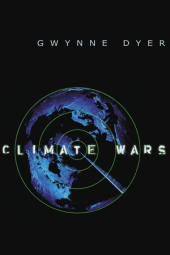
[Previous post on Climate Wars]
For most people it is hard to get a sense of what climate change may mean to society and the world. So the world gets 2C hotter. The daily temperature fluctuates far more than this amount. What difference will 2C make? The warnings of sea level rise may have a bit more weight with the general population but how many people really have a good sense of the elevation of a particular point on the map?
In his latest book, Climate Wars [Chapters, Amazon], Gwynne Dyer walks through what climate change means to societies throughout the world. This is accomplished through an interesting mix of fact, extrapolation and fiction.
A large portion of Climate Wars is dedicated to real world facts and ideas. This is the kind of information one might expect in a book on climate change. The current and past levels of carbon-dioxide, main sources and possible solutions are dispersed throughout. As are the best current climate change projections. While detailed and well researched, the discussion of the science behind climate change very accessible. One thing to note is that Dyer does not attempt to convince the reader that Climate Change is a real problem. He opens the book briefly explaining the scientific consensus and simply takes global warming as fact from there on. This in large part helps to keep the book interesting because it is not necessary to overwhelm the reader with facts to make the case.
From the scientific predictions, Dyer explains and extrapolates what they mean to various parts of the world in terms of agricultural productivity, water supply etc. For example, only a few degree rise in global temperature may cause the desert bands that exist above and below the equator to grow north and south. This could quickly destroy some of the most productive ecological and agricultural regions of the world. Specifically, much of the US’s productive agricultural area could turn to desert. On the plus side the growing season and hence agricultural productivity in Canada, northern Europe and Siberia may increase. This is likely of small consequence and dangerous envy to the rest of the world.
What really makes Climate Wars interesting is that Dyer takes the scientific predictions and creates fictional scenarios which outline and explore what effects climate change will have on world society. One such scenario discussed is what will happen at the US/Mexico border when agricultural failure becomes the norm in Mexico and South America. How many displaced people can the US accommodate before it is forced to close the border with lethal force? What will this huge influx of people mean to US society? What parts of the US may be inhabitable in the future? Similar scenarios investigate the fates of most of the major countries and regions of the world. Most of these scenarios are not pretty. This is especially true when you realize how climate change will affect countries who are relatively close to each other. For instance northern Europe, like a lot of the north, will weather climate change better than most other areas. Unfortunately, some of the advanced, industrial countries farther south will not fare so well. Will these countries sit back and watch their people starve or will they fight for resources?
Climate Wars is incredibly sobering and a bit scary. For me at least, it explains why climate change is a problem in a way that the typical, less complete discussions do not. The average person cannot see how a 2C temperature change can be a problem but they can understand how millions of starving people and many thousands of desperate people attempting to cross the border is. A slightly warmer world doesn’t seem like a problem until you realize that it will cause major population, resource and productivity shifts throughout the world.
Pingback: Dan Siemon » Climate Wars on CBC Ideas